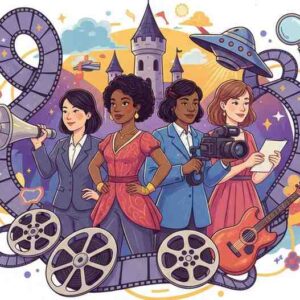Mumbai – 2025
In Indian cinema, music has always been front and center. But while audiences know the singers, composers, and lyricists behind their favorite songs, few realize the presence of another crucial creative force working behind the curtain:the music supervisor.
As Indian films become more global, stylized, and narrative-driven, music supervisors are emerging as thearchitects of sonic storytelling—curating soundtracks, negotiating rights, and shaping emotional continuity across visuals.
In a post-OTT, multi-genre world, this role is becoming not just valuable, but vital.
Who is a Music Supervisor?
A music supervisor is responsible for:
- Selecting and licensing songs used in a film or series
- Collaborating with directors, editors, and composers to align music with the narrative arc
- Curating existing tracks or commissioning original compositions
- Ensuring all legal rights and clearances are in place
- Bridging creative, legal, and budgetary considerations
Unlike composers, they don’t create the music—but they decidewhat music the audience hears and when.
Why Is This Role Gaining Ground in India?
Until recently, music selection in Hindi cinema was driven by instinct, director taste, or studio partnerships. But with:
- Multiple platforms (OTT, cinema, web)
- Rising demand for genre-specific scoring
- Heavy use of background tracks, folk pieces, indie songs
- Increased importance of mood-based storytelling
…music supervision has become an essential creative position.
Series likeMade in Heaven,Delhi Crime,Jubilee, and films likeGehraiyaanandQalashowcasedseamless sonic transitions—thanks in part to the unseen curators behind the music.
What They Really Do (That You Don’t See)
- Replace temporary music (“temp tracks”) with licensed ones
- Find obscure regional or independent songs that resonate culturally
- Balance composer-led scores with outside tracks for tonal contrast
- Handle sync licensing, a legal process that determines what music can be used where
- Work closely with editors to enhance pacing through sonic rhythm
In short, music supervisors act assonic storytellers and compliance managers rolled into one.
The Global Model Arrives in India
In Hollywood, music supervisors have long been recognized.Euphoria,Stranger Things, andBig Little Liesbecamesonically iconicpartly due to their curated tracks.
India is now catching up—with agencies and streaming giants hiringdedicated music supervisors, often with backgrounds in A&R (artists and repertoire), music journalism, or independent curation.
Professionals likeBhaskar Bose,Ankur Tewari, and teams at Excel Entertainment and Netflix India are leading this charge.
Challenges and Opportunities
Challenges:
- Lack of formal training programs in India
- Confusion over copyright laws and sync licensing
- Budget constraints in indie productions
- Poor documentation of legacy Indian music rights
Opportunities:
- Growing demand for global-quality music integration
- Expanding indie music scene offering fresh, licensable content
- Rising OTT productions with detailed musical briefs
The Future Score
As Indian cinema becomes more textured, diverse, and mood-dependent, the music supervisor will become acentral creative voice.
Not just someone who picks songs—but someone who understandsnarrative rhythm, emotional beats, and cultural texture.
The director tells the story. The actor lives it. But the music supervisor ensures the audiencefeelsit.









